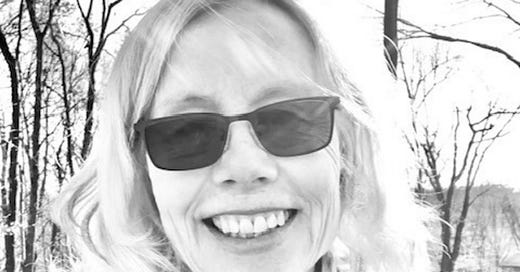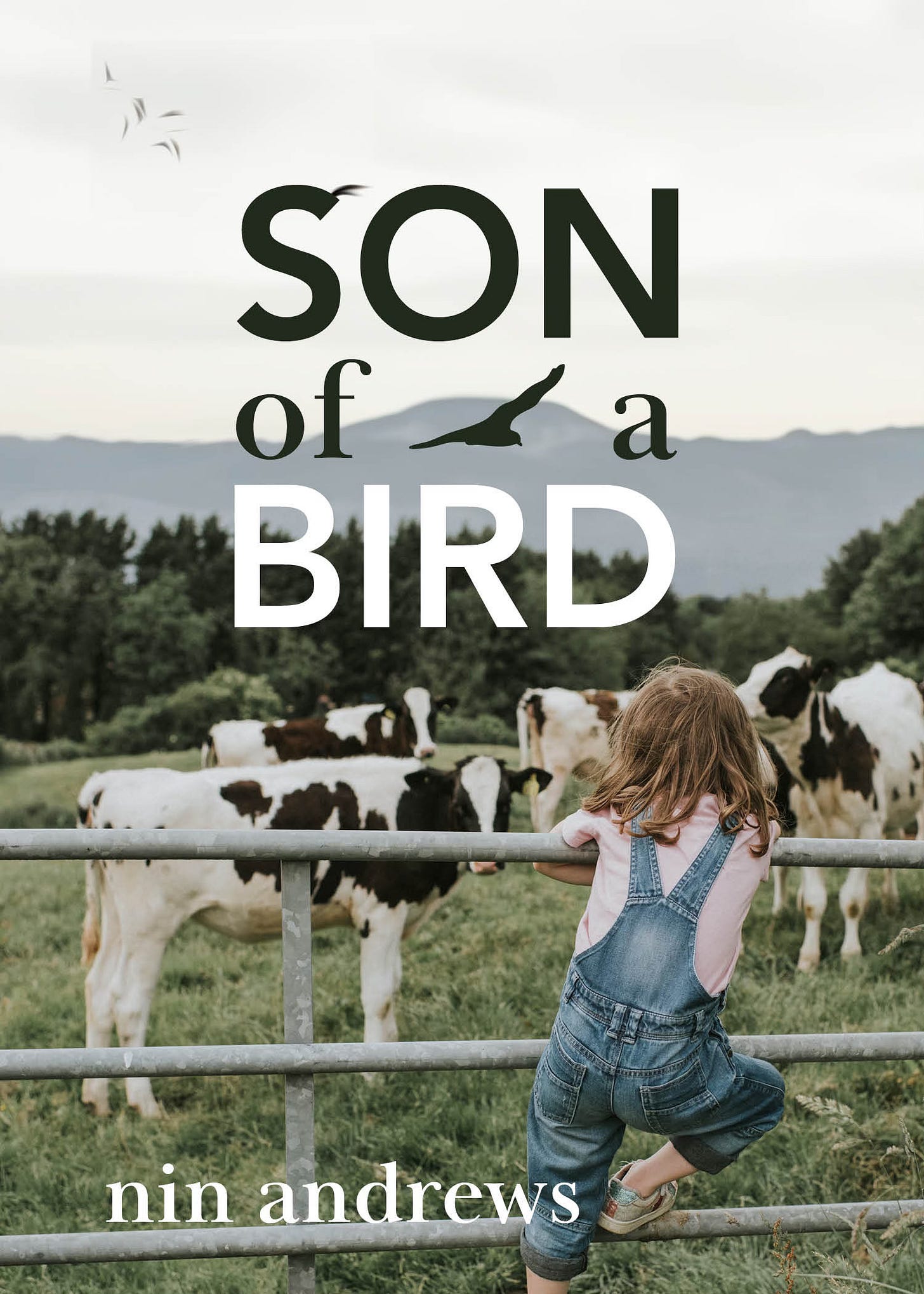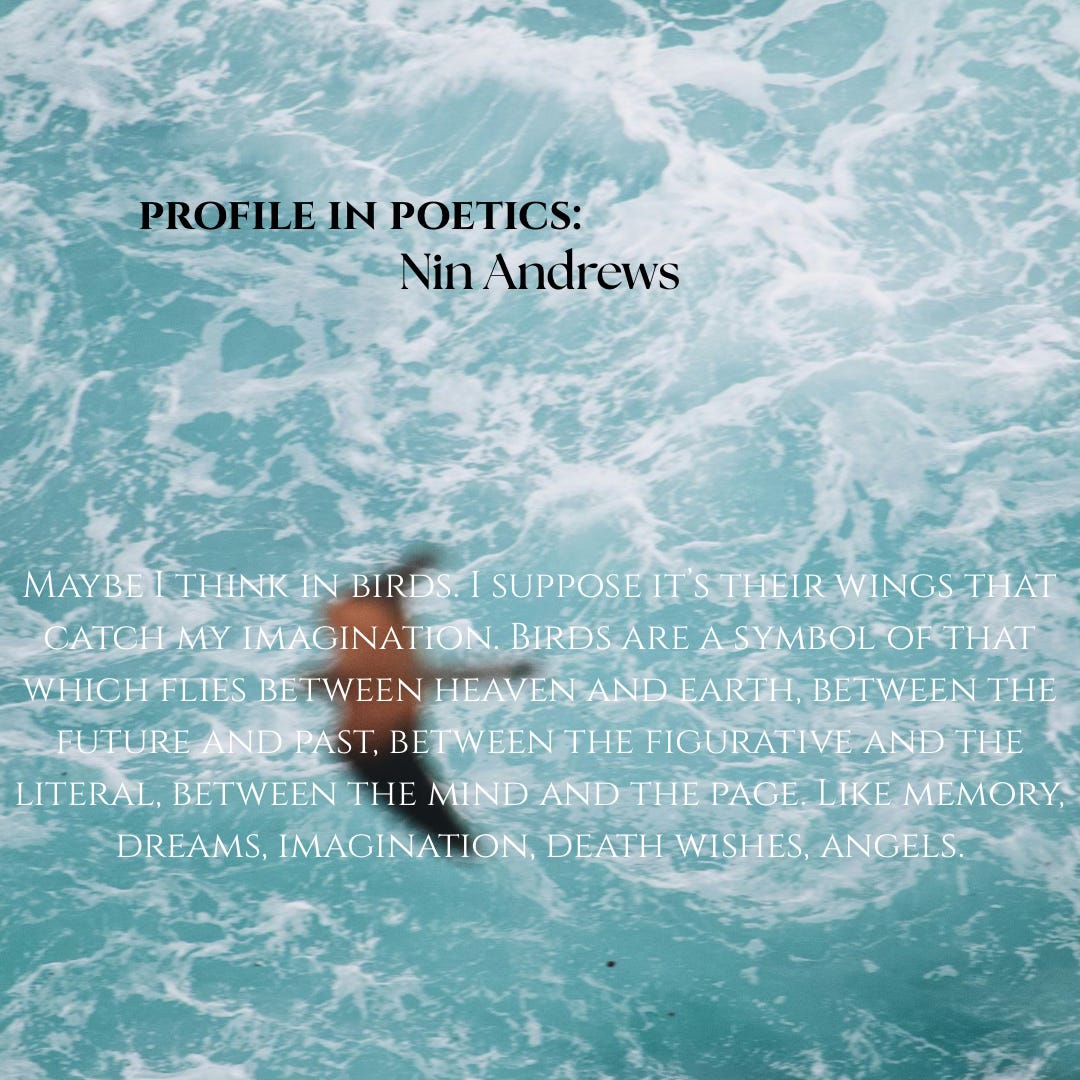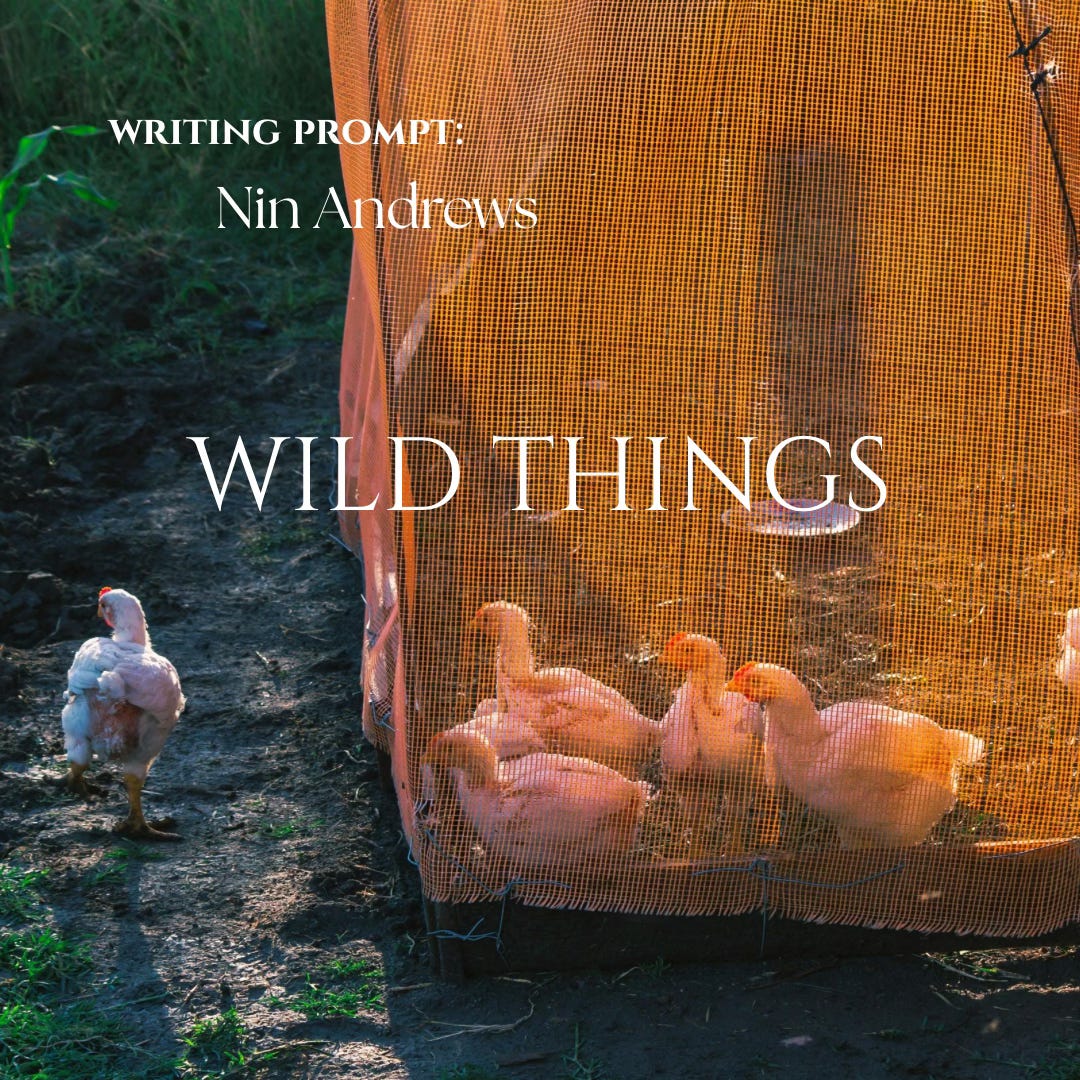Imagine for a moment you are a young farm girl. The youngest of a large family, you grow up around many animals, but notably birds crowd your immediate life as well as your imagination. Birds, you raise. In particular: chickens, parrots, and seagulls. You are cross-eyed and at the cost of your perceived well-being you become a medical guinea pig, one of research who is operated on five times from the age of one to thirteen. The anesthesia is ether, you are often sick, your mother is the absence of affection, on the spectrum, and your father is closeted gay. You almost die once. You almost kill yourself once. How does a child in this harrowing and eccentric space experience and navigate life?
In Nin Andrews’ memoir, SON of a BIRD, out from Etruscan Press just recently published in late April ’25, we find out how. Nin describes her exploration of life and writing as existentially insecure, admitting that she has, “never quite understood what [she is] doing here as a woman on planet earth.” Since the beginning, she expressed her desire to become an Arthur: an author. And it is clear this existential insecurity was an unfortunate, “gift from [her] parents who never felt comfortable in southern Virginia culture.” Instead of erasure, she in fact did become an author. She writes, “Twenty years ago, I was included in anthologies as the token woman prose poet. And as a daring woman who wrote about orgasms … Some were afraid to say the word, orgasm, aloud.” Now, pleasantly, her inbox is void of creepy emails asking about her sex life. She says, “Women writers, especially poets, have become more honest, open, and fierce.”
There is a paradox in this parent child exchange where brilliance is bred from near death. And internalized shame blooms from a silence of the self, into an urge to explode beyond it. Instead of why, perhaps it’s better to ask which type of bird do you occupy? According to Nin, “There are the predator birds, the hummingbirds, the songbirds, the unmelodious songbirds like crows and ravens, the caged birds, and the domesticated birds. And, of course, the death birds.”
Nin Andrews is the author of fifteen poetry collections including The Last Orgasm (2020), Miss August (2017), and Why God is a Woman (2015). She is the recipient of two Ohio individual artists grants, the Pearl Chapbook prize, The Wick Chapbook contest, and the Gerald Cable Award. Her poetry has been featured in numerous journals and anthologies including Ploughshares, Agni, The Paris Review, four editions of Best American Poetry, Great American Prose Poems from Poe to the Present, and The Best American Erotic Poems. Her poetry has been translated into Turkish, performed in Prague, and anthologized in England, Australia, and Mongolia. She is also the editor of a book of translations of the Belgian writer, Henri Michaux.
Sites and Socials
Instagram: nin_andrews
Website: ninandrews.com
Best American Poetry's blog: https://blog.bestamericanpoetry.com/the_best_american_poetry/nin-andrews/
1.) What were the first inspirations that made you desire to become a writer?
I don’t remember not wanting to be a writer. I grew up on a farm without a TV. My mother read aloud to keep her six children from fighting at the dinner table. She was a lovely reader—had taken elocution lessons at Bryn Mawr College and sounded like Katherine Hepburn. We were all hypnotized by her voice. When she read, I could see stories unfold in the theatre of my mind.
An Ancient Greek scholar, my mother studied with Richard Lattimore in college, and she read us the Greek myths, the Odyssey and the Iliad, books about Ancient Athens and Sparta as well as poetry, folk tales, fables, Bible stories, the King Arthur tales. According to family lore, I told everyone I wanted to be an Arthur. Meaning an author. Meaning someone who could weave a tale like that.
2.) Who have been mentor writers in your career?
David Lehman was the first. I will always remember the day when, in one of his college writing classes, a student complained that my poems were “too weird.” David responded, “Yes. Isn’t that great? She’s one of a kind.” There’s nothing like a professor giving a young writer hope.
Denise Duhamel served on a panel at AWP with me years ago—her poems about female sexuality are funny, tragic and spot on. She is a brilliant poet, a beautiful soul, and my partner in crime.
Eleanor Ross Taylor encouraged me not only to write but also to publish and not become a mere housewife or repress my creativity as she did in her early years of marriage to Peter Taylor. She also suggested I could become less surreal. “One day,” she said, “you will want to write about your extraordinary life.” I had never thought of my life as extraordinary. But she did. She knew my parents well. She often visited our farm.
Rick Bursky has kept me writing, even when I’ve wanted to give up, even when the voice in my head told me to quit. He was especially helpful with Son of a Bird. In the beginning, I really struggled with it. “Just keep going,” Rick said, adding, “You are not going to rest until you finish this book.”
These four poets have believed in me when I’ve had doubts. I feel lucky and grateful to have known them.
3.) How has your own work changed over time and why?
I have always felt existentially insecure—have never quite understood what I am doing here as a woman on planet earth. I studied religion and philosophy in college and in my earliest work, I was pondering my spiritual discomfort. In my first book, I imagined the orgasm as a god looking down at humanity, wondering why people suffer, why they can’t remain in bliss as she does, and what it would be like for her to become one of them. In my book, Why God Is a Woman, I created a magical island where gender roles are reversed, where men sprout wings and women like to ride, rule, and repress them.
In recent years, I have become, as Eleanor Taylor suggested, more autobiographical. My book, Miss August, based loosely on my life, is about a farm girl and her friend, a boy who wishes to become a girl, growing up in the South during the Massive Resistance. My new book, Son of a Bird, is, of course, a memoir.
Existential insecurity remains the driving force behind my writing. It’s a gift from my parents who never felt comfortable in southern Virginia culture. My father was a gay man who was kicked out of the Navy for having an affair with an officer. My mother was a New Englander, a dairy farmer, an Ancient Greek scholar, and on the autism spectrum.
4.) Have you been influenced by different genres, and if so, how?
I have been influenced by southern fiction writers like Flannery O’Connor, Eudora Welty, Harper Lee, William Faulkner, Carson McCullers, writers who portray the South I love and hate.
I have been influenced by magical realists like Gabriel García Márquez and Haruki Murakami, writers who helped me think about how to describe the child I was, a child who suffered from visions and fever dreams.
I have been influenced by poets as varied as Henri Michaux, Eduardo Galeano, Sylvia Plath, Nickole Brown, Rick Bursky, Grace Cavalieri, Denise Duhamel, Cassandra Atherton, Jan Beatty, Amy Gerstler, Russell Edson, and Frank Stanford, Peter Johnson, Elizabeth A. I. Powell, and Claire Bateman, poets who in different ways address the darkness we carry in our souls.
I have been influenced by memoirists as unlike one another as Dorothy Allison, Jan Beatty, and Li-Young Lee. Their memoirs touched that place I aim for when I write.
5.) What are your plans for the future?
I plan to keep writing—wherever it takes me. The writing comes first, and then I follow.
6.) What are your views on writing by women as it has occurred in the past twenty years?
Twenty years ago, I was included in anthologies as the token woman prose poet. And as a daring woman who wrote about orgasms. People would ask me how I had the nerve. Didn’t I worry about what my husband or children or parents thought? Some were afraid to say the word, orgasm, aloud. Sometimes I would give a reading and people would walk out. Now, female prose poets are not unusual, and many female poets write openly about sex. And the word, orgasm has become commonplace. It’s the name of a perfume—its scent can last up to 16 hours. It’s also a cocktail that will keep you up all night. I no longer get creepy emails from strangers asking me about my sex life. Women writers, especially poets, have become more honest, open, and fierce.
7.) Who are promising women writers to look at in the future?
There are so many: Kimberly Taylor, Virginia Konchin, Jessica Jacobs, Jessica L. Walsh, Julia McConnell, Rochelle Hurt, Cassandra Atherton, Sara Ries Dziekonski, Diana Khoi Nguyen, January Gill O’Neal.
Among my favorites today (they change with my mood): Amy Woolard because her books read like dark feminist southern fairy tales. Shivani Mehta because no one sounds like her. Virginia Konchin because of her mystical sensibility. Jan Beatty because she’s dangerous. Kelli Russell Agodon because of her recent poems about sexual identity.
8.) If you were asked to create a flexible label of yourself as a writer, what would it be?
Because nothing fits me perfectly, I wear all labels loosely. Like baggy clothes. I am a huge fan of wireless bras, stretch pants and suits, extra-soft fabrics and outfits I can dine and sleep and think in— in maximal comfort.
Gender labels, age labels, size labels, job labels, they are all restrictive. Literary labels as well.
The minute I say I’m a prose poet, the form I so naturally love and write, I compose a poem in verse, a poem that demands line breaks. I want the line, not the sentence, they scream. Only lines. Or I write an essay. Or a very short story. Sometimes an editor will suggest I publish these aberrations as prose poems so that all my work looks the same. So that I fit into the one container. In Son of a Bird, a Memoir in Prose Poems, the prologue is in verse. And no, it would not work as a prose poem.
Dear Past Self
When I visited my childhood home last week,
I could see you in the windows of our stone farmhouse
with your pink glasses and tiny eyes . . .
No, you weren’t ever that small, but that’s how I see you
now, as small as Thumbelina, and our house too, and the barns
where the horses and chickens slept, where the kittens
and foals were born each spring. Once, when the horses kicked
their stalls and whinnied in the night, you ran barefoot in the dark,
flashlight in hand, to check on them, and back in bed, unable to sleep
and out of breath, you wrote, Dear Future Me in script, imagining
me now. That was the night Dad’s horse, Ella, died. We phoned
the vet, but by the time he arrived, Ella was dead. You tried
to think of other things, like how you wanted to grow up and be
a horse, or the fastest runner on earth, or the best high jumper.
That’s what you wished for on every birthday, star,
and on every point of pie which you saved to eat last
because otherwise your wish wouldn’t come true—at least according
to your dad. You practiced eating grass, whinnying and trotting,
cantering and galloping, before jumping all the horse jumps
one by one. Sometimes you fell and skinned your knees
or banged your head, but you kept practicing until your legs ached,
and you were soaked with sweat. But still you couldn’t sleep.
Dear Future Me, you wrote in entry after entry. Please come back.
Don’t forget. Write about me. About the horse I am. Or almost am.
Only make me prettier. And fast. Back then you didn’t love you very much
and hoped I’d make you better after the fact. Which is strange,
I think, for a child. Strange also to be an insomniac, already
staring out the window at the dark, afraid of sickness and death
and old age, already picturing yourself as an old woman looking back
or down, like an owl swooping over the fields of the past,
memories like scared mice scampering through the grass.
9.) Shame is explored on countless fronts. In the beginning its visibility jumps at us like you describe as a child, thinking of jumping from the rooftop, “what a relief! To feel just air, to hear the wind in my ears, no advice, no shame holding me in place.” (8) And elongated and further developed throughout through issues of identity, mental health and even contemplations of suicide. Your mother intimating, “how dare you embarrass me.”(122) This age old shame cycle is illuminated through Virginia Wolf as you remind yourself she once said not to tell anyone if you are hearing voices.
The act of writing your memoir is in direct resistance to this shame spiral. Your family dynamic is an extraordinary combination of a closeted gay man and a woman with Aspergers. Of all characters in the book, these two characters are the most illuminated in their eccentric flaws and parenting styles. Could you reflect on these statements, illuminations, and the paradox of your story as it confronts issues of shame?
Paradox indeed! My parents, the very people who taught me to reduce myself to anorexic proportions, to try to look and act like everyone else, to feel deeply ashamed of my eccentricities and appearance, especially my crossed eyes, were also the people who taught me to understand and love our basic human differences. I loved/admired my parents in part because they were so unlike other parents, because they didn’t fit in, because they were unique and brilliantly so, because they were gay or on the spectrum, because they suffered, just to be themselves. Their differences were like unclaimed gifts.
But I barely survived them. I came very close to killing myself. It’s an experience I don’t like to remember, a time when my mind turned against me, when all I wanted was out. I am thinking about the college years, but I suppose my mind was disturbed long before that.
I used to wonder why, but after writing this book, it’s not as much of a mystery.
I grew up as a lonely, cross-eyed farm girl, and I was also a medical guinea pig—an eye surgeon at Boston Children’s Hospital and family friend used me for his medical research and operated on my eyes five times between the ages of one and thirteen. My mother didn’t stay in the hospital with me—instead she handed me off to medical students, nurses, and the surgeon. I didn’t do well in hospitals. Nor did I do well under anesthesia. This is back in the day when ether was the anesthesia of choice. I was often sick afterwards, and once, I almost died.
In page after page, I wake in hospitals: a skinny, freckled girl, stretched out in a bed, fast asleep. The doctor enters my room, inserts a tube into my nose and throat. “This won’t hurt,” he whispers. He says he will drain the signs. Maybe he meant sinuses. I am young enough to play with paper dolls. I know this because I pull a paper doll from my pocket and introduce her to the doctor. “Her name is Galaxy,” I say. “She’s scared. I have another doll called White Lightning, but she's invisible. And another one called Gazelle.” Back then I talked to the doctor and the nurses, even in my sleep. So did my dolls. Galaxy didn't like the doctor— said all doctors lie. Nurses, too. But Gazelle said the nurses are nice. I never trusted Gazelle. She had a magic marker smile. The others left their faces blank. But it was White Lightning who screamed so loud, I swear I saw snowflakes in the ceiling. They fell so slowly through the air; some went up instead of down. I woke up gagging, the doctor sobbing by my side. “We thought we’d lost you,” he said, adding, “Anesthesia is not your friend.” Anesthesia, I thought then, was a Russian princess or evil stepmother who poisoned me again and again.
I developed an aversion to hospitals, doctors, anyone wearing a white coat. “Can we stop the surgeries?” I begged my parents. But my parents were too ashamed of my appearance and what they called my “mental and physical weakness.” I soaked up that shame. I felt it deep in my bones. I spent years trying to prove to them and myself that I wasn’t that ugly, scared, sick child anymore. Of course, a part of me will always be her.
I don’t know when I finally realized it was their own shame they were projecting onto me. Their discomfort. That they, too, suffered.
10.) Death becomes its own almost magically lyrical persona and landscape throughout the book, sometimes humorously poked and other times in illuminating consumption. You experienced several eye surgeries as the youngest child of many and the memories decorate this interior. Death ‘always comes back’ to be shooed away by a kind caretaker and even in adulthood as ‘winter grandmother’ who listens, “I can’t go on like this. Am I dead like you?” (120) Can you speak more to this death character as to how it colored the wallpaper of your childhood and informed your adulthood.
As a child, I saw things no one else saw. Honestly, I don’t know what they were. Many nights a giant black bird landed on my windowsill, a bird as tall as a man, and stared in at me. I was certain he was real. I was certain he was Death. Sometimes I would study him—he was neither good nor evil. He simply was. A fact. A future. Why a bird? I often wondered. Maybe he was a fever dream. Maybe he came from Poe’s “Raven,” which my mother had read aloud to me. Maybe he was like the vultures I watched fly over the farm that alerted me to the death of a calf or foal, the vultures that landed on dying cows, eager to be the first to pluck out their eyeballs. Or the vulture I witnessed on the rear of a cow who struggled giving birth, her calf dangled—half-in and half out. The vulture was pecking at her stillborn baby.
Then again, the bird I called Death could have been a vision that occurred in the druggy delirium I experienced after one of my eye surgeries. Whatever the cause, the death bird was a guardian angel/demon of my childhood. Sometimes, I still sense the bird watching me.
My parents don’t talk about it, so I don’t either—the night I have to be rushed to the hospital, my fever climbing 103, 104, 105, the fat-legged nurse with nylons that went scratch-scritch telling me I’m trying on a new dress as she snaps the hospital gown behind my neck. “Can I keep it?” I ask. “Yes, of course,” she says, but she doesn’t mean it. Grown-ups say a lot of things they don’t mean. Like how there’s nothing to worry about. I listen as the doctors and my parents speak in hushed voices, passing shadowy words back and forth: seizures, delusions, brain damage. My mother’s faces floats above me like a cloud while Death crouches in the corner, shifting his weight from one foot to the other. “Don’t you see him?” I asked my mother later. “He has a crow’s head and wings and he’s six feet tall.”
“Whatever you do,” she hissed, “don’t tell anyone else.”
11.) The title of your book is SON OF A BIRD, A MEMOIR IN PROSE POEMS. And this common bird theme we see flocking together in numerous occasions. Mother is described as a ‘little brown bird’, “a train of feathers floating behind her.” (22) You state your ‘death wish’ hovered above you as a bird. Memory sweeps down like an owl in a meadow. Can you expand on this chosen symbol?
Maybe I think in birds. I suppose it’s their wings that catch my imagination. Birds are a symbol of that which flies between heaven and earth, between the future and past, between the figurative and the literal, between the mind and the page. Like memory, dreams, imagination, death wishes, angels.
Of course, there are many famous bird poems: “Ode to a Nightingale,” “To a Skylark,” “The Raven,” “The Windhover,” “Thirteen Ways of Looking at a Blackbird,” “The Rime of the Ancient Mariner.” And I love Gabriel García Márquez’s short story, “A Very Old Man with Enormous Wings,” in which a fallen angel is kept in a coop and looks like an aging chicken.
Different kinds of birds remind me of different kinds of people and/or ways of being in the world. There are the predator birds, the hummingbirds, the songbirds, the unmelodious songbirds like crows and ravens, the caged birds, and the domesticated birds. And, of course, the death birds.
As a girl, I raised many birds: chickens, parrots, seagulls. And starlings that fell from the eves on the side of the house, and a sparrow that blew out of tree, rescuing them before the barn cats could eat them.
The starlings and sparrows I found after they had already imprinted on their real mothers, so they always knew they were birds. Still, they screamed and opened their beaks wide whenever they saw me, expecting a meal. I liked watching them hopping and pecking and fluttering here and there, but, like my mother, they weren’t particularly affectionate. Also like my mother, they were eager to fly away as soon as they were able. If my mother had had wings and if she had lived in a different era, she might have been gone long before I was born.








